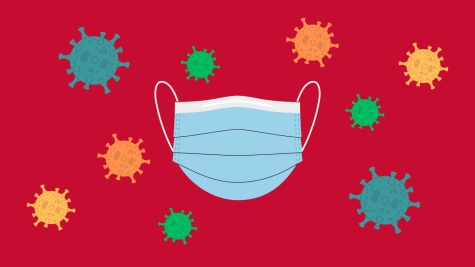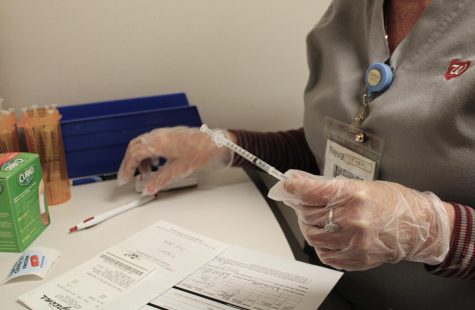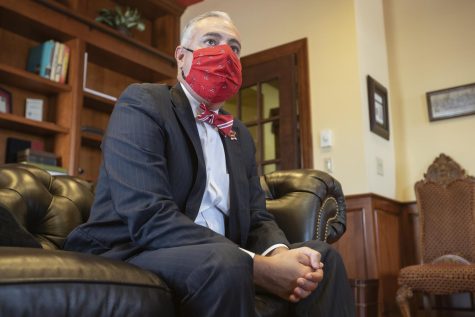Greed never dies: Similarities between “The Masque of the Red Death” and coronavirus pandemic
March 27, 2020
Albert Camus, author of “The Plague,” wrote, “There have been many plagues as wars in history; yet always plagues and wars take people equally by surprise.”
There are many lessons that can be learned from classic literature. Humans are forever evolving, yet history is continually repeating itself. Not only does literature capture history, but it can aid readers during a time of crisis.
Today, we are experiencing a global health crisis with the rising number of infections and deaths from COVID-19, also known as the coronavirus. Not only are people dying, but many are losing their jobs due to economic slowdown. Those who were financially struggling prior to the pandemic are suffering the most, as countless workers have families to feed and bills to pay. Some workers aren’t even given the opportunity to self isolate, which is a public health issue in and of itself.
This isn’t the first time the world has experienced widespread infection, and it certainly won’t be the last. An example of a piece of literature written about this topic is Edgar Allan Poe’s “The Masque of the Red Death,” a short story first published in 1842.
The protagonist of this story is Prince Prospero, the wealthy ruler of a fictional country. His country has been plagued by “the Red Death.” Its symptoms were “sharp pains, and sudden dizziness, and then profuse bleeding at the pores, with dissolution” that killed its victim in 30 minutes. Although the disease is horribly uncontrollable, Prospero remains positive, showing his ignorance for the pain of his people.
The coronavirus is nowhere near as deadly as the Red Death, but the purpose of this comparison is to recognize the behavior of very privileged people in situations of panic, particularly concerning health. In “The Masque of the Red Death,” the elite created an illusion of control by distracting themselves with an abundance of entertainment, whereas the poor were left outside without any means of protection.
When half of the country died off, Prospero invited 1,000 friends to join him in quarantine. After five or six months of seclusion, he decides to throw an extravagant masquerade ball.
The party was lively until the large ebony clock in the last chamber rang at midnight. The music came to a halt and a mysterious presence appeared. The figure was wearing a mask, which follows the attire of the ball. He was “tall and gaunt, and shrouded from head to foot in the habiliments of the grave.”
The tale ends with everyone at the ball being infected by the Red Death. It was Prince Prospero’s arrogance that set him and his guests for a brutal death, despite being young and healthy. Their selfishness aided their own demise. This alludes to the downfall of feudal Europe and the rigid class structure.
Currently, many celebrities are experiencing backlash due to their own insensitivity and greed. Every day, more and more people are being infected by COVID-19. Countless patients in critical condition are waiting to be tested, yet rich people receive priority without showing any symptoms. Bill de Blasio, the mayor of New York City, tweeted, “Tests should not be for the wealthy, but for the sick.”
Although “The Masque of the Red Death” was written almost two centuries ago, there is a modern day parallel between the Red Death and the coronavirus—they are both capable of bringing tragic deaths. The Red Death is fictional, as it was developed by Poe’s imagination, but it is inspired by existing diseases. In Poe’s personal life, he was deeply affected by deaths caused by tuberculosis including his birth mother, adoptive mother, and his wife. Because of this, it is speculated that symptoms of the Red Death were influenced by TB.
When preparation for the coronavirus became urgent, the rich prepared differently from the average person. According to a New York Times article, “The rich are ditching first class for private planes. Jet-setters are redirecting their travel plans to more insular destinations. And wealthy clients are consulting with concierge doctors and other VIP health care services.”
Although done subtly, stock ownership appears to influence votes in the House and Senate; some lawmakers seem to care more about their financial self-interest, showing where their morals lie.
Along with this, stores all over the nation have been selling out of basic household items. There are many families who can’t afford to stock up, so when they are in need of an item, it may not be available to them.
Businesses have been producing luxurious versions of air masks and hand sanitizer (also sold out), which shows their priority of profiting and maintaining their power rather than managing a worldwide health crisis.
Poe wrote “The Masque of the Red Death” to warn uncaring elites about class warfare. As a cautionary tale, it has a pessimistic nature, but it promotes charity. This piece of writing is meant to frighten readers into altruism. Poe perfectly exaggerates the fear and confusion that accompanies a viral illness.
In times of emergency, it is important to maintain rationality and listen to science, but it is equally as important to listen to the narratives of authors and artists.
Opinion writer Ruby Chapdelaine can be reached at [email protected]




















